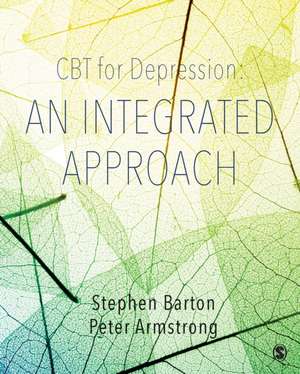CBT for Depression: An Integrated Approach
Autor Stephen Barton, Peter Armstrongen Limba Engleză Paperback – 9 noi 2018
Preț: 334.94 lei
Nou
Puncte Express: 502
Preț estimativ în valută:
64.10€ • 66.67$ • 52.92£
64.10€ • 66.67$ • 52.92£
Carte disponibilă
Livrare economică 24 martie-07 aprilie
Livrare express 07-13 martie pentru 39.14 lei
Preluare comenzi: 021 569.72.76
Specificații
ISBN-13: 9781526402745
ISBN-10: 1526402742
Pagini: 312
Dimensiuni: 186 x 232 x 16 mm
Greutate: 0.54 kg
Ediția:1
Editura: SAGE Publications
Colecția Sage Publications Ltd
Locul publicării:London, United Kingdom
ISBN-10: 1526402742
Pagini: 312
Dimensiuni: 186 x 232 x 16 mm
Greutate: 0.54 kg
Ediția:1
Editura: SAGE Publications
Colecția Sage Publications Ltd
Locul publicării:London, United Kingdom
Cuprins
Chapter 1: Introduction
Part I: Established CBT Therapies
Chapter 2: Cognitive Behavioural Therapy
Chapter 3: Behavioural Activation
Chapter 4: Relapse Prevention
Part II: Integrated CBT
Chapter 5: Self-Regulation Model of Depression
Chapter 6: Treatment Components and Processes
Part III: Challenging Sub-Types
Chapter 7: Early-Onset Depression
Chapter 8: Highly Recurrent Depression
Chapter 9: Chronic and Persistent Depression
Part IV: Complex Cases
Chapter 10: Biopsychosocial Interactions
Chapter 11: Comorbid Anxiety Disorders
Chapter 12: Post-Traumatic Depression
Chapter 13: Reflections and Synthesis
Part I: Established CBT Therapies
Chapter 2: Cognitive Behavioural Therapy
Chapter 3: Behavioural Activation
Chapter 4: Relapse Prevention
Part II: Integrated CBT
Chapter 5: Self-Regulation Model of Depression
Chapter 6: Treatment Components and Processes
Part III: Challenging Sub-Types
Chapter 7: Early-Onset Depression
Chapter 8: Highly Recurrent Depression
Chapter 9: Chronic and Persistent Depression
Part IV: Complex Cases
Chapter 10: Biopsychosocial Interactions
Chapter 11: Comorbid Anxiety Disorders
Chapter 12: Post-Traumatic Depression
Chapter 13: Reflections and Synthesis
Notă biografică
Descriere
Rooted in evidence-based practice, this book introduces an approach to CBT for depression that integrates cognitive-behavioural models and therapies. It draws on components of first, second and third-wave CBT to help readers tailor therapy to the needs of individual clients.
